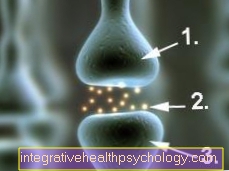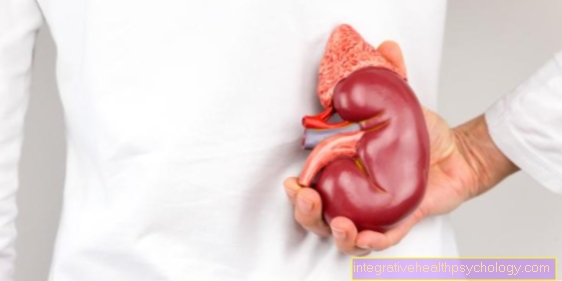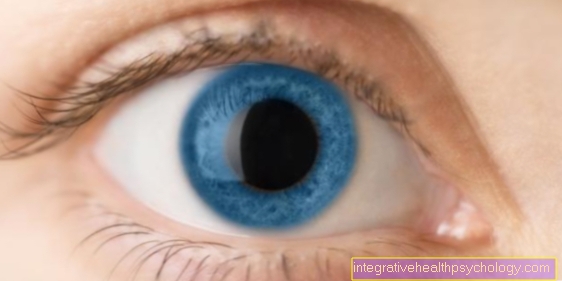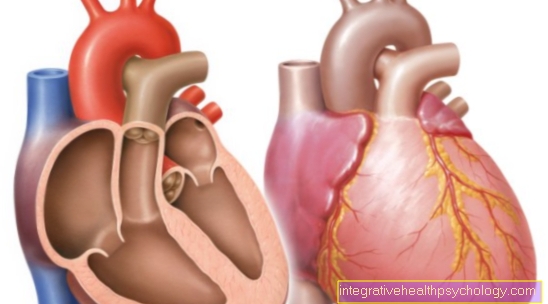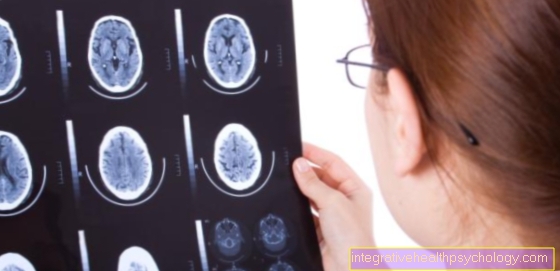Always tired - what can I do?
introduction
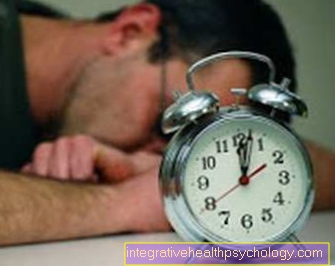
Many people suffer from constant fatigue or are always tired.
The causes for this phenomenon are very diverse and often let through lack of sleep or revision to explain.
Chronic fatigue is very exhausting for those affected, as this significantly limits their performance in everyday life and at work.
The reserves are used up and one results quickly mental and physical overload. The permanent fatigue can therefore also become the basis for illnesses, as the person affected less resistant are.
For this reason, there should be a noticeable kink in performance with persistent weakness must be clarified. Next comparatively harmless Causes, which are mostly behind it, can possibly also be more serious reasons.
causes
There are many reasons for persistent daytime sleepiness.
The most common causes are that directly influence the day-night rhythm, such as lack of sleep, constantly getting up early in connection with strenuous physical or mental activity, or nocturnal sleep problems.
Even if the daily routine is changed frequently and does not follow a constant regularity, it can result in increased tiredness and lead to the fact that you are always tired. The body then has difficulty adjusting to the changing daily rhythm. In general, tiredness can be seen as a warning signal from the body that something is missing.
Many physical, but also mental problems result in symptoms of fatigue. The body needs a lot of energy in these situations to cope with these problems. This energy is then lacking for everyday situations, which the person concerned notices in the early onset and persistent tiredness.
In addition, a permanent state of tiredness can also be a sign of a serotonin deficiency.
Read more about this: Serotonin Deficiency - Symptoms and Therapy.
Since the causes of fatigue are so diverse, it is not always easy to quickly find out the individual cause. The following causes are potentially possible.
- Living conditions: lack of sleep, stress, excessive or insufficient demand, lack of exercise, lack of fluids, overweight or underweight, high-fat meals (especially before going to bed), diets, strong sunlight, growth phases (children), cycle-related fatigue in women, pregnancy, menopause, psychological stress ( To care)
- Organic causes: various infectious diseases (including, for example, Pfeiffer's glandular fever caused by the Epstein-Barr virus), anemia (anemia), Heart diseases, lung diseases, disorders of the hormonal balance (for example due to diseases of the thyroid, parathyroid or adrenal cortex), diabetes (Diabetes mellitus), Autoimmune diseases, liver diseases, kidney diseases or gastrointestinal diseases, malignant diseases (tumor) or nocturnal pauses in breathing
- Mental illnesses: Depression, burnout syndrome, anxiety disorders, eating disorders, dementia, alcohol abuse, Parkinson's, multiple sclerosis, and much more.
- Medicines: sleeping pills, psychotropic drugs, blood pressure drugs, migraine drugs, antidepressants, drugs against allergies (e.g. antihistamines), various painkillers, chemotherapeutic drugs
In addition to the above, there are also various other reasons why you are always tired. These should be clarified from patient to patient on a case-by-case basis.
Symptoms

People who are affected by daytime sleepiness experience a drop in performance either immediately after waking up or early in the day. There is a weak drive, the eyelids become heavy and keep falling shut.
Those affected are significantly less resilient, quickly react to irritation and are prone to emotional outbursts.
Alarm sign
In a stressful phase of life, daytime sleepiness does not always have to be a worrying condition.
During such times, the body is often drained and demands more sleep and variety, this can manifest itself as more frequent tiredness. When this period is over, however, the tiredness should also subside.
A possible warning sign is when the tired phase is not followed by an active, awake phase; the person concerned is still constantly tired, although there is no obvious reason for this.
It is also conspicuous if the tiredness shows no improvement after sleep, physical activity or recovery phases, the tiredness is significantly more pronounced and persistent than normal or it occurs suddenly without the person concerned having exerted himself excessively beforehand.
A medical examination should be carried out, especially if other symptoms are added to the tiredness.
These include, for example, nausea and vomiting, general malaise, fever, profuse night sweats, unwanted weight loss, pain, dizziness, shortness of breath, depressed mood and memory problems.
The general rule is that the cause of fatigue should be investigated if it noticeably affects everyday life and leads to a noticeable drop in performance.
Diagnosis

Since the causes of persistent fatigue can be very diverse, the doctor must first find one Overview of living conditions of the patient procure.
A detailed conversation at the beginning of the diagnosis is therefore part of it. It is interesting for the doctor how long the tiredness already exists, in what moments she occurs and how long it then lasts.
It is also important whether it seems inappropriate that you are always tired, i.e. whether it occurs after activities that were actually not perceived as particularly strenuous or whether they even start early in the morning after you wake up.
Factors affecting fatigue strengthen or improve, can also be of interest to the doctor. Fatigue that does not improve after sleep or recovery is more of a cause for concern.
The doctor will eventually go after too Habits ask, for example, about the Sleep-wake rhythm and the Sleep quality, if Difficulty falling asleep or Difficulty sleeping through the night exist whether nocturnal pauses in breathing or snoring were noticed.
It is also interesting whether the person concerned enough exercise does, has gained or lost weight, how he eats, whether he smokes or frequently drinks alcohol.
To also psychological factors the doctor will also clarify Problems in private and professional life ask. Is the person concerned in a exceptional stress situation? He often does Mood swings, Self-doubt or a depressive mood?
With regard to professional life, it can also be important to know whether the patient is there Handling chemicals or other harmful substances Has. Under certain circumstances, these can affect your health and thus be the cause of fatigue. It is also essential which medication the patient is taking and whether he has noticed any other symptoms in addition to fatigue.
After clarifying the basic information about the living conditions and the degree of fatigue in the patient, the doctor can various examinations and tests carry out to clarify the tiredness more precisely. Through the conversation, he may already have an idea in which direction to investigate further, so the following diagnostics used in a more targeted manner can be.
After a general physical examination the next step is often the Referral to a specialist. The family doctor will select this depending on the suspected cause. Possible specialists who can take care of the patient's persistent tiredness are neurologists (if the diagnosis is suspected, a nervous fatigue), Cardiologists (if a Heart disease), Diabetologists (if a Diabetes), Endocrinologists (if a hormonal cause tiredness), psychologists or psychiatrists (if a psychological cause).
Other specialists can also be consulted. These specialists can then depending on the area of expertise Do some research into what could be the reason why you are always tired. For example, a (load) -EKG written, examines the blood for various metabolic diseases, one MRI or Computed Tomography made or one Ultrasound examination different organs are carried out.
In many cases, the cause of the ever-present fatigue can be quickly determined through the various examination measures.
therapy
The therapy for tiredness depends largely on its cause. Is it just an issue Overwork and lack of sleepSo it is important that the person concerned his Living conditions reconsidered, better structured and also learns to take care of himself.
A regular sleep-wake cycle Sleeping at least seven hours can often relieve tiredness. Also the nutrition should healthy and balanced be.
Late high-fat meals are often heavy in the stomach and at night hinder night sleep. Daytime sleepiness is the consequence. Sufficient physical activity is also part of it if persistent tiredness is to be eliminated in everyday life. All in all is one healthy lifestyle therefore very important to combat permanent fatigue.
However, if the fatigue is caused by other factors, these must first be treated. This applies to all diseases, the symptoms of fatigue cause.
Infectious diseases bacterial nature can use Antibiotics make necessary viral infections usually need symptomatic treated and cured.
Hormonal disorders not infrequently require that Use of medication, for example from Thyroid hormones at a Hypothyroidism. Mental illness can be relieved by psychotherapy or, if necessary, by psychopharma.
People who deal with chemicals and poisons on the job and who then develop excessive fatigue due to these substances may need to be retrained and all in one other profession be accommodated.
Is tiredness one malignant disease this must be based on - depending on the type and characteristics of the Cancer - if necessary by a surgery, one Irradiation and or chemotherapy be treated.
forecast
The forecast the constant tiredness also depends largely on its cause.
Mostly, however, the tiredness will improve as soon as that fixed underlying problem is. Because the fatigue mostly due to harmless causes is conditional is the prognosis very good on averagewhen the person concerned structures their everyday life better, does not bother at work and allows themselves enough sleep.
Fatigue in the frame acute disease states (e.g. flu infection, gastrointestinal infection) usually only exists temporarily for the duration of the infection and disappears after a few weeks at the latest.
This is an exception Pfeiffer's glandular fever represents an infection with the Epstein-Barr Virus (EBV). This disease is common prolonged states of tiredness along with that, even after acute symptoms have subsided for a couple of months can persist.
prophylaxis

Since persistent fatigue can have many different causes no direct prophylaxis recommended to avoid these conditions.
However, it is generally valid that a healthy lifestyle can help to prevent everyday fatigue. Since fatigue is often caused by overwork and lack of sleep, it is very useful to to structure the daily routine wellnot to take over and Time for relaxation and sleep to plan.
A person who is rested and relaxed can too Do more in shorter working hours, as someone who spends a lot of time at work but is overworked, exhausted, and chronically tired.
time for yourself is very important for staying healthy and active. The regular daily routine should be supplemented by balanced diet rich in vitamins and adequate physical activity.
An easy one is enough Endurance training of 3x30 minutes per week.
The nutrition should not too high in fat his and many Fiber, fruits and vegetables contain. Especially Red meat (Pork, beef, game) should not too often to be consumed.
Is better Mediterranean food with fish, more spices instead of salt and lots of vegetables.
For more information on a balanced diet, read our main article Wholesome nutrition.
Nicotine consumption should be avoided and the Restricted alcohol consumption become.
In addition, a sufficient amount of water to drink of at least 2 liters be respected per day. These are particularly recommended water and unsweetened teas. These rules of conduct create a good basis for maintaining health and vitality.
Of course, this cannot avoid all factors that can lead to persistent fatigue, but one healthy people have more energy reserves and can Better ward off disease.
Fatigue after eating
Fatigue after eating is not necessarily a cause for concern. Many people first feel this a short time after eating Need to rest. That's because the Gastrointestinal tract becomes active and begins digestion.
During this time this becomes part of the body better blood supply and needs more energy. The blood serves that Removal of nutrientsthat are absorbed through the intestinal lining and released into the blood. The volume of blood and the oxygen carried by the blood then missing elsewherewhich is noticeable through fatigue.
However, tiredness after eating can also have other reasons. Is the meal consumed very high in carbohydrates, the body then releases insulin. This is a hormone that causes the The body's sugar balance regulated and the Absorption of sugar into the body's cells controls.
Some people are prone to one excessive insulin release following high-carbohydrate meals. This creates one very rapid drop in blood sugar levels and subsequently to one Hypoglycaemia. However, since the metabolically active body cells need a lot of sugar in order to work efficiently, fatigue occurs.
Last but not least, fatigue after eating can also through components of the food be evoked. This is especially true of foods that much Tryptophan (a amino acid) include, for example, meat and sausage, various types of cheese, peanuts and hazelnuts, fish, eggs and legumes.
Tryptophan is absorbed by the body and used in Serotonin transformed. Serotonin is a important messenger substance in the brain and works for example mood lifting. However, it can also cause tiredness, which is why this can occur after consuming foods very rich in tryptophan.
Also very high fat meals lead to increased fatigue, as they make one particularly high digestive effort require. A Walk after eating on the other hand, it can prevent the onset of lead tiredness and also stimulates digestion.
So after eating, it is partly normal that you are always tired.
Fatigue and cancer
Exhaustion and tiredness in the context of cancer and its therapy occur in almost all patients.
In this context one also speaks of Fatigue, one extreme exhaustion, from which up to 40% of the patients suffer permanently even after the end of the therapy. She can get through the cancer itself, but also through Side effects of the therapyOrgan damage or psychological consequences of cancer (depression, Anxiety) be conditional.
The aggressive ones Chemotherapy drugs act on the dividing tumor cells, but also on healthy, dividing-active cells such as the Blood cells in the bone marrow. Chemotherapy can be a Anemia (anemia) induce that is through increased susceptibility to infection, paleness, weakness, shortness of breath noticeable under stress and fatigue.
Under a acute fatigue syndrome As a result, almost all patients who are treated with chemotherapy suffer. However, this is improving within a few weeks after the end of therapy.
It is largely unclear why it lasts significantly longer or even permanently (always tired) in some patients. The will be discussed Related to depression through difficulties in the mental processing of cancer, Disturbances in the sleep-wake cycle and Metabolic disorders.
It is particularly important that the sick person is supported emotionally, and he the Learn to process illness emotionally.
This is very difficult for the individual patients, which is why each patient has to find a way how he can best cope with it. Self-help groups, psychotherapeutic conversations and a open communication with the relatives can help.
So it is important to explain that one is always tired with cancer therapy.
Fatigue and thyroid
The thyroid plays an important role in the body's hormonal balance.
She produces the Thyroid hormones Thyroxine and Triiodothyronine. This regulate many metabolic processes in the body, increase energy expenditure and stimulate the metabolism.
However, if the thyroid is not working properly, this is usually done through a Variety of symptoms noticeable. At a Hypothyroidism (Hypothyroidism) become too little thyroid hormones formed or released.
This can be innate or - what is more common - by a Inflammation of the thyroid gland or Iodine deficiency caused. Those affected notice the hypothyroidism, for example fatigue, weakness, Slackness, Weight gain, Hair loss, increased sensitivity to cold or depressed mood.
Persistent fatigue so can Symptom of an underactive thyroid be. They become therapeutic Thyroid hormones replaced and delivered to the patient in tablet form. The Thyroid levels in the blood should regularly checked to see if levels return to normal; if so, patients usually have no further restrictions and can lead a normal life.
A Hyperthyroidism (Hyperthyroidism), on the other hand, manifests itself through somewhat opposite symptoms. Those affected are nervous, lose weight, sweat a lot, to have Racing heart, suffer sleep disorders or one Trembling of hands (tremor) and are often irritable. fatigue heard not to the symptoms an overactive thyroid.
In summary, one can say that there is more likely to be an underactive thyroid if one is always tired.
Eye fatigue

The eyes become heavily used every day. Especially through long work on the computer become very strenuous and start quickly, dry to become, to itch or to burn.
If you turn away from the screen after a long period of computer work, this is the Vision often blurred. The eyes are tired and can no longer focus well on the environment.
That is because the eyes are working on screen long time in one position remain. This puts a strain on the eye muscles. In addition, you blink very little when you look at a screen. The Tear production is reduced and the eyes dry out faster.
It is helpful to frequent short breaks while working at the screen to insert so that the eyes get variety. It can be helpful to to blink more oftenso that the humidification is improved. Targeted focusing of various objects with the eyes stimulates the eye muscles and loosens them up. Also should the Well lit workplace so that the eyes do not have to strain themselves even more.
Tired and dry eyes are common too in too dry air justified. Especially in the Winter months are many rooms overheated and the dry heating air has a negative effect on the eyes. Therefore, the Room briefly aired regularly become. Additionally is on adequate hydration to watch out for, because dry eyes are more prone to Infections, for example for Conjunctivitis.
Ultimately, there are several reasons why eyes are always tired!
Fatigue and pregnant
In the pregnancy the female body has to achieve a lot. Of the Hormonal balance changes, the metabolism suddenly has to take care not only of the mother, but also of the growing child.
For the mother it is Pregnancy very exhaustingso that fatigue is very common.
Especially in the first third pregnancy, where the woman's body has to completely rearrange itself, fatigue occurs very often.
In the last part of pregnancy exhaustion and tiredness are above all during physical exertion present because the child has become much bigger and heavier and it is tiring for the woman to climb stairs or walk longer distances.
During pregnancy blood pressure drops usually too something off. This can contribute to symptoms of fatigue. Since the child also feeds on the maternal metabolism, it decreases Blood sugar levels drop faster. This can also cause fatigue.
Most of time tiredness disappears with the beginning of the second trimester of pregnancy and can towards the end pregnancy reinforce again.
It is important that the fatigue also yielded becomes.
The body needs its own in these moments Sleep and its recovery.
Short breaks or a nap can help relieve tiredness. In addition, a healthy and balanced diet be respected.
The fatigue should be very pronounced and also do not improve with adequate sleep and rest, a visit to the doctor is generally advisable.
There could be other causes behind the tiredness.
Fatigue and iron deficiency
Iron deficiency can to severe tiredness to lead. That's because iron very important for blood formation is.
The red blood cells (Erythrocytes), which transport oxygen in the blood, consist partly of iron. Suits the body too little iron available, he can not enough red blood cells form.
It results in a Anemia (anemia). This in turn is the Blood oxygen levels decreased and the Organs and tissues of the body fewer with oxygen provided. However, oxygen is very important for the metabolism of cells.
Of the Lack of oxygen in the brain is noticeable through a distinct tiredness and weakness.
Can be diagnosed Iron deficiency anemia by a Blood test.
causes for iron deficiency, for example Malnutrition or Bleeding be. Therapeutically, one should first try compensate for the iron deficiency by changing your diet. If this does not succeed, it can Iron also in tablet form are fed. The blood count should be regularly checked to check if the treatment is successful.
Usually improves then that too Fatigue very quickly, because the red blood cells are again adequately equipped with the iron-containing hemoglobin and the Oxygen transport more effective again can take place.
If you are always tired, you should always think about iron deficiency.
Fatigue and diet
If you are always tired, you can with one improper or poor diet related.
The body needs certain ingredients of food in order to optimal metabolic conditions to manufacture. Especially for that Blood formation different substances are essential, for example iron and Vitamin B12.
Both substances are used for the Red blood cell formation needed. Iron is in red blood pigment (hemoglobin) and is responsible for the Oxygen binding.
At a Iron deficiency is therefore too little hemoglobin and the oxygen transport is insufficient to adequately supply all organs and tissues. Fatigue results.
Also at Vitamin B12 deficiency creates a Anemia (anemia). Another classic symptom is fatigue.
Also a low blood pressure makes tired. So it should be on a adequate hydration be careful of at least 1.5 liters of water per day. This should also physical movement occur.
Fatigue can eventually also come through Vitamin deficiencies be evoked. In the diet should therefore Several servings of fruit and vegetables daily be integrated.
High fat meals should rather be avoided, because greasy food is one long residence time in the gastrointestinal tract has and thereby lots of energy for digestion must be applied. This, in turn, causes drowsiness. A balanced nutrition Having a lot of fruit, vegetables, fiber and sufficient fluid intake is therefore optimal for that Maintain vitality and drive.


